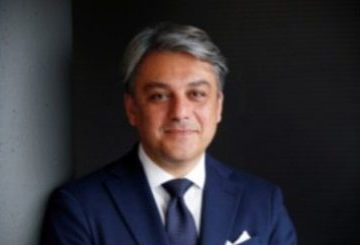Luca de Meo (born 13 June 1967) is currently the CEO of Renault.[1]
Born in Milan in 1967 to parents originating from Locorotondo,[2] de Meo received a degree in Business Administration from Bocconi University in Milan. In his thesis, he examined business ethics and it was the first dissertation on this subject in Italy.[3]
De Meo has more than twenty-five years of experience in the automotive sector. He began his career at Renault, prior to joining Toyota Europe, followed by the Fiat Group, where he was head of the Lancia, Fiat and Alfa Romeo brands and CEO of Abarth. During his time as Fiat, he was considered a protégé of Sergio Marchionne, carrying a significant responsibility over the launch of the new Fiat 500, however, Marchionne was disappointed at his results while he was leading Alfa Romeo.[4]
De Meo joined the Volkswagen Group in 2009, as marketing director of the brand of Volkswagen and of the Volkswagen Group, prior to taking up the position of board of management member for sales and marketing at Audi AG. He was president of SEAT from November 2015 to January 2020.[5] In January 2020 it was announced that he would be the CEO of Renault effective July 2020,[6] leaving Renault without a CEO for another five months due to a non-compete clause with Volkswagen Group.[7]
De Meo speaks five languages[4] (Italian, English, French,[7] German[8] and Spanish), was a teaching fellow at SDA Bocconi School of Management, and is the author of the book Da 0 a 500, Storie vissute, idee e consigli da uno dei manager più dinamici della nuova generazione (From 0 to 500. Lived stories, ideas and advices from one [of] the most dynamic managers of the last generation).[9]
In January 2021, de Meo presented "Renaulution", the new strategic plan for Groupe Renault, which aims to shift the strategy from volume to value.[10]
In 2017, he was named Bocconi Alumnus of the Year, for representing the university values of professionalism, initiative, integrity, responsibility and openness to pluralism.[3] His competences in leadership are said to be in marketing, product planning, having attention to detail and avoiding conflict, while he lacks an engineering background.[4][8] His personality has been described as collegial, humorous and culturally adaptive.[8]
De Meo was named "commendatore" by the Order of Merit of the Italian Republic, and Harvard University dedicated a case study to him in 2013, for his work in the Volkswagen Group as marketing director.[11]
In March 2021, King Felipe VI of Spain awarded him with the Grand Cross of the Order of Isabella the Catholic.[12]
De Meo is married to Silvia Goracci and has two sons.[2][13][14]
Renault S.A. is a French multinational vehicle manufacturer established in 1899. The company produces a range of cars and vans, and in the past, trucks, tractors, tanks, buses/coaches and autorail vehicles. In 2011, Renault was the third biggest European automaker by production behind Volkswagen Group and PSA and the ninth biggest automaker in the world by production in 2011.[5]
Headquartered in Boulogne-Billancourt, the Renault group is formed by the namesake Renault marque and subsidiaries Automobile Dacia from Romania and Renault Samsung Motors from South Korea.[6] Renault has a 43.4% controlling stake in Nissan of Japan,[7] a 25% stake in AvtoVAZ of Russia and a 1.55% stake in Daimler AG of Germany. Renault also owns subsidiaries RCI Banque (providing automotive financing), Renault Retail Group (automotive distribution) and Motrio (automotive parts). Renault Trucks, previously Renault Véhicules Industriels, has been part of Volvo Trucks since 2001. Renault Agriculture became 100% owned by German agricultural equipment manufacturer CLAAS in 2008. Renault has various joint ventures, including Turkish Oyak-Renault, Iranian Renault Pars, Chinese Dongfeng Renault. Carlos Ghosn is the current chairman and CEO and the French government owns a 15 percent share of Renault.[8]
As part of the Renault–Nissan Alliance, the company is the fourth-largest automotive group.[9] Together Renault and Nissan are undertaking significant electric car development, investing €4 billion (US$5.16 billion) in eight electric vehicles over three to four years from 2011.[8]



